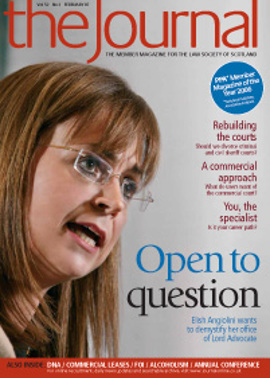FOISA goes to court

If Kevin Dunion, the Scottish Information Commissioner, were a racehorse, his name would never be off the lips of the denizens of William Hill. At last, the Freedom of Information (Scotland) Act 2002 has produced some case law from the Inner House – Common Services Agency v Scottish Information Commissioner [2006] CSIH 58; Scottish Ministers v Scottish Information Commissioner [2007] CSIH 8 (William Alexander’s application, and David Elstone’s and Martin Williams’ applications). The Information Commissioner has won every round.
Although the Act was passed in 2002, it did not come into force until 1 January 2005. This, of course, is but an evening gone, compared to ss 25-29 of the Law Reform (Miscellaneous Provisions) (Scotland) Act 1990. These have been inert on the statute book for the past 17 years, despite apparent plans to bring them into force in the 1990s and questions being asked by MSPs and the Scottish Consumer Council. The provisions would allow any professional or other body, subject to certain statutory arrangements, to enable any of its members to acquire rights to conduct litigation on behalf of members of the public, and rights of audience in the courts. It is this set of facts which gave rise to William Alexander’s application.
The Commissioner ordered the release of certain information which had been withheld from Mr Alexander by the Scottish Ministers; they had supplied him with a quantity of documentation already. The Commissioner took the view that:
“It seems to me to be reasonable for citizens to question why legislation has still not been commenced… Mr Alexander has pointed out that the equivalent legislation came into force in England and Wales 15 years ago under the Courts and Legal Services Act 1990, and that plans for increasing competition still further are currently being considered there”.
The Commissioner also attached importance to the increasing debate over “Tesco law” and access to justice.
The Alexander case is of particular interest to the legal profession, not just because of the subject matter of the unenacted provisions, but because some of the information handed over fell under s 36 of the Act. This covers, inter alia, what is commonly called legal professional privilege. The Alexander case represents a rare instance of the Commissioner ordering the release of legal advice.
The Elstone and Williams applications both relate to planning consent for a waste disposal and ecological conservation area at Trearne Quarry, Gateside. Again, the Inner House refused both appeals from the Scottish Ministers and upheld the release of information.
The nature of “information”
The Common Services Agency case concerned a request for details, by census ward, of recorded instances of childhood leukaemia. The CSA declined to hand details over where very small numbers were involved and they were as a consequence concerned about indirect identification of living individuals. They offered instead the aggregated data for Dumfries and Galloway for the years where they held it.
The Commissioner took the view that, while such data did indeed constitute personal data within the meaning of the Data Protection Act 1998, and therefore fell within the exemption at s 38 of the 2002 Act, the problem could be solved by a process called “barnardisation”. A standard statistical method used to minimise the risk of identification of individual patients, it involves the random modification of small numbers. The total number of diagnoses of leukaemia in Dumfries and Galloway children under 14 from 1990 to 2001 was 15, for 47 census wards.
The CSA countered that they did not hold these data in a “barnardised” form. Therefore, their argument ran, this was not information held by them. The 2002 Act only requires Scottish public authorities to hand over such information as they hold, not to create data anew. It was argued for the Commissioner that, even if the barnardised data, which could be provided without undue difficulty, might be viewed as different information from the raw data held by the CSA, the CSA was obliged by s 15 of the Act and the code of practice issued under s 60 to provide advice and assistance to seekers after information.
Again, the Inner House unanimously found for the Commissioner. Students of the Data Protection Act 1998 will find para 23 of the Lord President’s decision of particular interest:“I have come to the view that a table setting out the census ward data for 1990-2001 for the Dumfries and Galloway postal area, barnardised in the manner described, would not constitute personal data of any of the children resident in Dumfries and Galloway who had in a relevant year been diagnosed with leukaemia. Although the underlying information concerns important biographical events of the children involved, by the stage of the compilation of the barnardised table, that information has become not only statistical but perturbed to minimise the risk of identification… It is no longer, in respect of any child, ‘biographical in a significant sense’… The rights to privacy of the individual children are not infringed by the disclosure of barnardised data.”
Perhaps the most ringing general endorsement, however, lies in the judgment of Lord Marnoch, who said at paras 31-32:
“As regards the proper construction of the Freedom of Information (Scotland) Act 2002 I take, perhaps, an even more liberal view… I do not myself think it necessary to attach any very technical meaning to the word ‘holds’… While the ‘information’ under the Act must be ‘recorded’
(s 73), I conceive that it will take many forms and it is clear… that an applicant can request either a digest or summary… I am of the opinion that the statute, whose whole purpose is to secure the release of information, should be construed in as liberal a manner as possible and, so long as individual and other private rights are respected, and the cost limits are not exceeded, I do not myself see any reason why the Commissioner should not be accorded the widest discretion in deciding the form and type of information which should be released in furtherance of its objectives, including that of giving advice and assistance under s 15 of the Act.”
Restraint on appeal
A similar respect for the Commissioner’s discretion was shown in the Alexander case. Apart from the explicit reminder at para 24 that “In this field it may be necessary to distinguish between what it is not in the public interest to disclose because to do so would impede the working of government and what would by its disclosure simply embarrass ministers or officials”, it is clear that the courts were both reluctant to breathe down the Commissioner’s neck and to some extent inhibited from doing so by the nature of the Act:
“It is important… when considering these authorities, to bear in mind that the respondent, in giving reasons for his decision, is necessarily retrained by the need to avoid, deliberately or accidentally, disclosing information which ought not to be disclosed. That restraint also affects the ability of the court if provided only with the respondent’s decision, to supervise the exercise by him of his powers” (para 18).
Apart from that, an appeal to the Inner House can only be made on a point of law. There was a rather complex construction of one in the Alexander case – when it was argued that the Commissioner had erred in law by insisting on a document-by-document treatment of relevant exemptions. It failed.
Clearly there will be many more appeals from the Commissioner to the Inner House, and the Commissioner is unlikely to retain a perfect record. However, it is a good story for him so far. This arises in part from his close treatment and discriminating approach to applications; it is rare that a request for information which reaches his office in St Andrews results either in wholesale disclosure or wholesale withholding of information. The judges, however, also seem minded to approach their appellate function with a light touch.
These cases have not only been a good story for the Scottish Information Commissioner. They have resulted in good stories for the Scottish media; nothing draws the journalistic nose like a buried body, or even just a suspicion of one. The Scottish public authorities which have brought cases to the Inner House so far have only done so in matters which plainly seem to them to raise points of principle. The Scottish Ministers, in particular, who receive so many freedom of information requests, have taken the majority of their defeats on the chin.
The cases so far illustrate the wisdom of such stoicism where FOISA is concerned. If you act for a Scottish public authority which wishes to appeal against a decision of the Scottish Information Commissioner to hand over information, you will be likely to advise your clients that they need a clear point of law, a clear conscience and a clear winner – if there be such a thing in litigation.
Rosalind M M McInnes is a solicitor with BBC Scotland
In this issue
- Routes to qualification: the Italian picture
- Speaking of change
- Disabled from suing?
- Hearing and answering
- Court afresh
- Clean sheet at the Commercial Court
- Making a specialism pay
- LCN DNA - devil in the detail
- To buy or not to buy?
- Just a winter warmer?
- Views from the new boy
- Working out time
- A claim in trust
- Incapable of dismissal?
- Chasing debts made simple?
- Scottish Solicitors' Discipline Tribunal
- Website reviews
- Book reviews
- FOISA goes to court
- On the wrong track?






